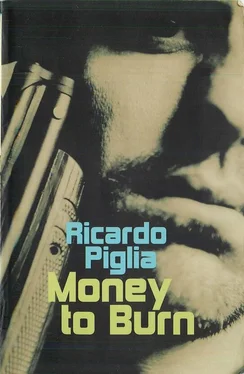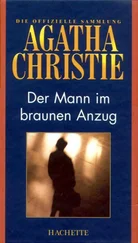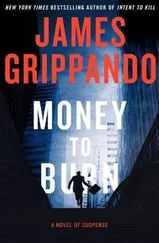Ricardo Piglia - Money to Burn
Здесь есть возможность читать онлайн «Ricardo Piglia - Money to Burn» весь текст электронной книги совершенно бесплатно (целиком полную версию без сокращений). В некоторых случаях можно слушать аудио, скачать через торрент в формате fb2 и присутствует краткое содержание. Год выпуска: 2004, Издательство: Granta UK, Жанр: Современная проза, на английском языке. Описание произведения, (предисловие) а так же отзывы посетителей доступны на портале библиотеки ЛибКат.
- Название:Money to Burn
- Автор:
- Издательство:Granta UK
- Жанр:
- Год:2004
- ISBN:нет данных
- Рейтинг книги:5 / 5. Голосов: 1
-
Избранное:Добавить в избранное
- Отзывы:
-
Ваша оценка:
- 100
- 1
- 2
- 3
- 4
- 5
Money to Burn: краткое содержание, описание и аннотация
Предлагаем к чтению аннотацию, описание, краткое содержание или предисловие (зависит от того, что написал сам автор книги «Money to Burn»). Если вы не нашли необходимую информацию о книге — напишите в комментариях, мы постараемся отыскать её.
Money to Burn — читать онлайн бесплатно полную книгу (весь текст) целиком
Ниже представлен текст книги, разбитый по страницам. Система сохранения места последней прочитанной страницы, позволяет с удобством читать онлайн бесплатно книгу «Money to Burn», без необходимости каждый раз заново искать на чём Вы остановились. Поставьте закладку, и сможете в любой момент перейти на страницу, на которой закончили чтение.
Интервал:
Закладка:
On the floor there still lay two.45 pistols, a PAM submachine-gun and a.38 calibre revolver, and in two untidy cases there still remained a few projectiles: that was the arsenal with which the three gunmen had mounted their fifteen-hour-long resistance, under siege from over 300 policemen.
He smiled to himself, sitting alone with his voices reverberating inside him, lower now, then fired off another round, just to let them know he was still there.
They were going to come for him when darkness fell, along the corridors, hunting him down, the search parties. They went around town in a black trap, wearing double-breasted suits. They got down at the station and there they deposited their handcuffed prisoners. They took Crazy Anselmo that way, all the people following behind, they boarded him on to the train, stuck him in an economy class compartment, a cop on either side, because he'd slit the throat of his boss who'd come across him committing a robbery at La Blanqueada. He was an immigrant killer, an assailant, and they'd hunted him through the villages and towns, and found him at dawn in the shunting yard at the station. His boss came down specially to insult him ('Filthy foreign shit') and the old eyetie Anselmo took him out with a stiletto. It was around this time that he, Dorda, must have been how old, maybe twelve or thirteen, around that sort of age, if his memory served him at all. After then nothing, as if someone had come along and erased everything else inside his head, and he'd remained stuck at that period of his life, only able to recall what had happened when he was little and that was it. They took the eyetie Anselmo out of the black trap and stood there waiting for the train to arrive bringing its load of passengers up from the south, on the empty station platform at Pila. The two cops and Crazy Anselmo, in his sandals and grey overalls, because he used to work for the post office, which was where he had started opening the envelopes and stealing their contents, writing letters to the women, then visiting them, and raping them, according to what people said. It seemed as if he only delivered the letters containing bad news, on grounds of his being a superstitious sort. They found the rest of the letters in the basement of his house, clearly logged, and when they found him, he came out shooting, and dedicated himself to rustling cattle and butchering the meat around the province, also to raping country girls in the most remote ranches of its furthest-flung corners. Dorda now managed to remember all of this, leaning out of the window and peering sideways, watching them move, there below in the street.
The killer went with his hands cuffed in front of him, wrists tied to his waistband, but staring haughtily, proud of being an evil man, a rebel, the train tracks staring up at him and the two cops, with their moustaches and ponchos, quietly smoking, because they had the whole line to accompany him down to La Plata, on the passenger train from Bahia Bianca.
'That's how you're going to end up,' the dead woman told him that night.
The skylight in flat three and the breach in the dining-room wall on the second-floor neighbouring flat looking into the bedroom exposed a view of Mereles who had fallen 'dorsally supine' against the bedsprings propped against the far wall. With extreme care one could even perceive, from flat number eleven, Brignone, whose corpse lay in 'an intermediary position' between the kitchen and the hall. Only the third assassin was missing.
The light was now entering between the curtains. He had enough drugs for another couple of hours.
'Bring me some dope,' he yelped.
'Surrender, you piece of shit,' came the reply.
Through the breach opened to next door, the bodies of two gunmen could be seen, lying prone and riddled with innumerable bullets. Poised on the threshold, the foot of one gunman appeared to bear witness to a final attempt at flight in shooting his way out. Then in the flaťs dining-cum-living room lay the rest of his bloodstained body, face upwards, submerged in a pool of his own blood that spread out across almost the entire surface of the room. A few centimetres further on lay the other gunman, similarly soaked in his own lake of blood. The first gunman had been dressed in blue jeans and a white shirt; at his side lay his weapon: a Thompson machine-gun. The second gunman had been wearing blue trousers and a brown shirt. The third still remained seated, his back to the window, crouched in an alcove. That man was Dorda.
They ran like rats through the passages, the cops. A priest would come and give him a blessing.
'I'll take one more fix, with your permission, then come and get me if you wish.'
Just in case, they fired off a few more rounds through the breach then chucked more teargas grenades in through the bathroom window. There was no reaction. A policeman leaned out into the corridor and a few seconds later fell riddled by a machine-gun round.
The entrance door to the flat was swinging, like a petrified sign of death, on its lower hinges and bore the traces of a thousand perforations rent by bullets. Trails of splinters and traces of smoke, powder and blood filled the corridor.
He had always been an object of interest for doctors and psychiatrists. The born criminal, the man who had been ruined since boyhood, dying by the law. It was a fate from which there was no escape and to which he had been brought like Anselmo to his economy class carriage in the Southern Railways. He didn't like the countryside, the plains were boringly flat, but he'd escape during siesta hour and get up on to the harvesters, they had an iron seat, wrought with holes, awkward to clamber on to, and you had to use a plank to brake with. He'd had the good fortune to mount the draught horses which were tethered to the carts, by threading a length of rope through the saddle-rings and under the girth, so the cart could be pulled forward. When you got them up the embankments, you could rest there near the wire fences, choosing the spot for two reasons. Number one, you had a panoramic view of the tracks and secondly because, all along the embankments, you tended to find gopher-holes and you could catch the rodents with the help of the dogs.
He came to the city and went to live in a hostel, down in Barracas, but it was not something he talked about, he hardly even remembered it.
Inside the building, in the alcove where the double bed had been, there was nothing left but a heap of wood shredded by repeated explosions caused by teargas grenades and the raking of machine-gunfire.
The whole place was bathed in blood.
It was as if a demolition company had moved in and completely destroyed the masonry. There was nothing left at all of the building; all that remained standing were the retaining walls.
The police were not inclined to enter. They could not be certain, from the positions they had assumed, whether the three gunmen had committed suicide, or had died by one or another round of machine-gunfire let off against the front door, or else had died by a hand grenade that had been thrown at them from the floor above, through a hole opened up in the roof with a pneumatic drill.
Dorda remained there, his weapons within reach, considering how to shoot his way out to the finale. He had awarded himself one more shot of cocaine.
'Remember, Kid, when you walked down the middle of the road, when you were young, looking for pigeons' eggs in Bolivar, in the summertime. They bathed in the muddy waters of the lagoon and pricked the eggs with a pin and downed the contents in a gulp.'
There was nothing left of the countryside, it was all under surveillance by the cops. He had these fast-flowing images, of a road and a car arriving filled with heavily-armed men. The voices were saying incomprehensible things to him, speaking to him at times in the sweet idiom of the little Polak in the furnished rooms. Who the hell was to know what she wanted to say, or how much she had suffered, poor thing, such a pretty woman, they brought her over by deception, on the pretext of marrying her off to a man of position, but then they locked her up in a boat and brought her into the interior and forced her to work at Madame Iniguez's establishment (the Chilean woman). She was a peasant girl who knew how to sew and make goulash, and they'd brought her over so she could have a family far from war and hunger. On one occasion he'd decided, as if in a dream, as if it were something he'd heard tell, that the best thing to do would be to kill her, he clearly heard her asking for him to kill her. He didn't want to, he couldn't want to. He tried to get the idea out of his head, but it had taken hold like vermin, like ticks, the voice, and the Gaucho closed his eyes, because the girl was standing at the foot of his bed, naked, with her russet hair reaching to her waist, and he could feel inside his skull a cramp like the wires transmitting his electric shocks, a voice ordering him to kill her, addressing him in that idiom peculiar to her that nobody in the region could comprehend, and yet the words were also begging him please to do her the favour of saving her, sparing her from the suffering of being among such brutal peasants from the neighbouring provinces (yes, exactly that, 'the neighbouring provinces'), nobody understood that she was a Polish princess who could no longer withstand solitude and suffering ('the suffering'), they had separated her from her daughter, from Nadia, they had taken her off to a doctor, because they said she had typhus ('had typhus'). A man gave her 100 pesos and took the infant wrapped in a napkin, took her off on a cart, then unloaded her at the brothel in Chivilcoy (as Dorda explained to Bunge). And the Gaucho understood those words, the words the Polak was saying, the captured princess, as though they were agreed signals, and she was telling him that they had loaded her on to a cart and taken her to the province of Santa Fe to work with the labourers gathering in the harvest, to be a camp follower and now she was lost, relegated to a special little cell because the blacks always chose her, because she was a redhead, a European, but she desired only to die and she permitted the Gaucho to caress her feet, and to act as her servant; naked, she stood facing the mirror, gazing at him with her princess's eyes, begging him to kill her and the Gaucho paid attention to that voice issuing such softly-spoken orders, telling him what to do, and reached for his Beretta down the side of his boot and targeted her eyes and in that instant her face transformed into an expression of terror that the Gaucho would never forget, it stayed with him forever stamped on his brain, the certainty that perhaps she'd become petrified at the ultimate moment, as happens to suicides when they finally repent and attempt to stay alive after all, and she was entirely nude, her russet hair streaming down her back and her hand raised, like this, in a holy gesture of blessing and terror while the Gaucho blew her head off.
Читать дальшеИнтервал:
Закладка:
Похожие книги на «Money to Burn»
Представляем Вашему вниманию похожие книги на «Money to Burn» списком для выбора. Мы отобрали схожую по названию и смыслу литературу в надежде предоставить читателям больше вариантов отыскать новые, интересные, ещё непрочитанные произведения.
Обсуждение, отзывы о книге «Money to Burn» и просто собственные мнения читателей. Оставьте ваши комментарии, напишите, что Вы думаете о произведении, его смысле или главных героях. Укажите что конкретно понравилось, а что нет, и почему Вы так считаете.












